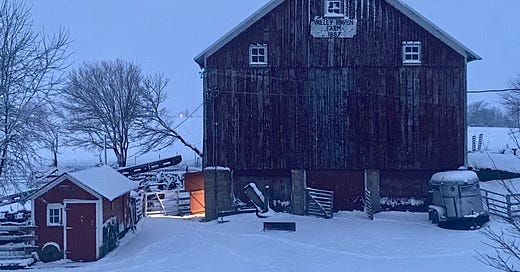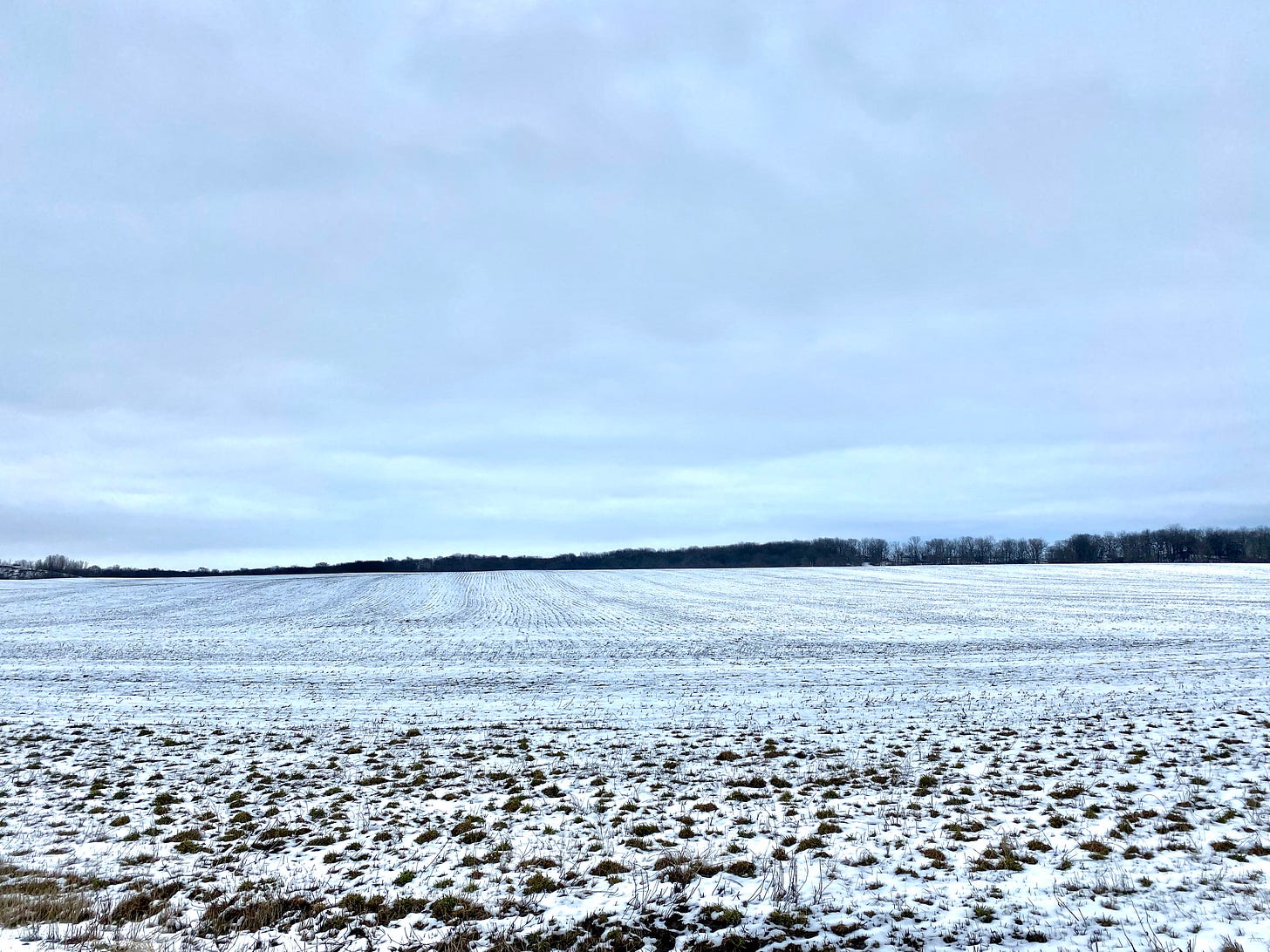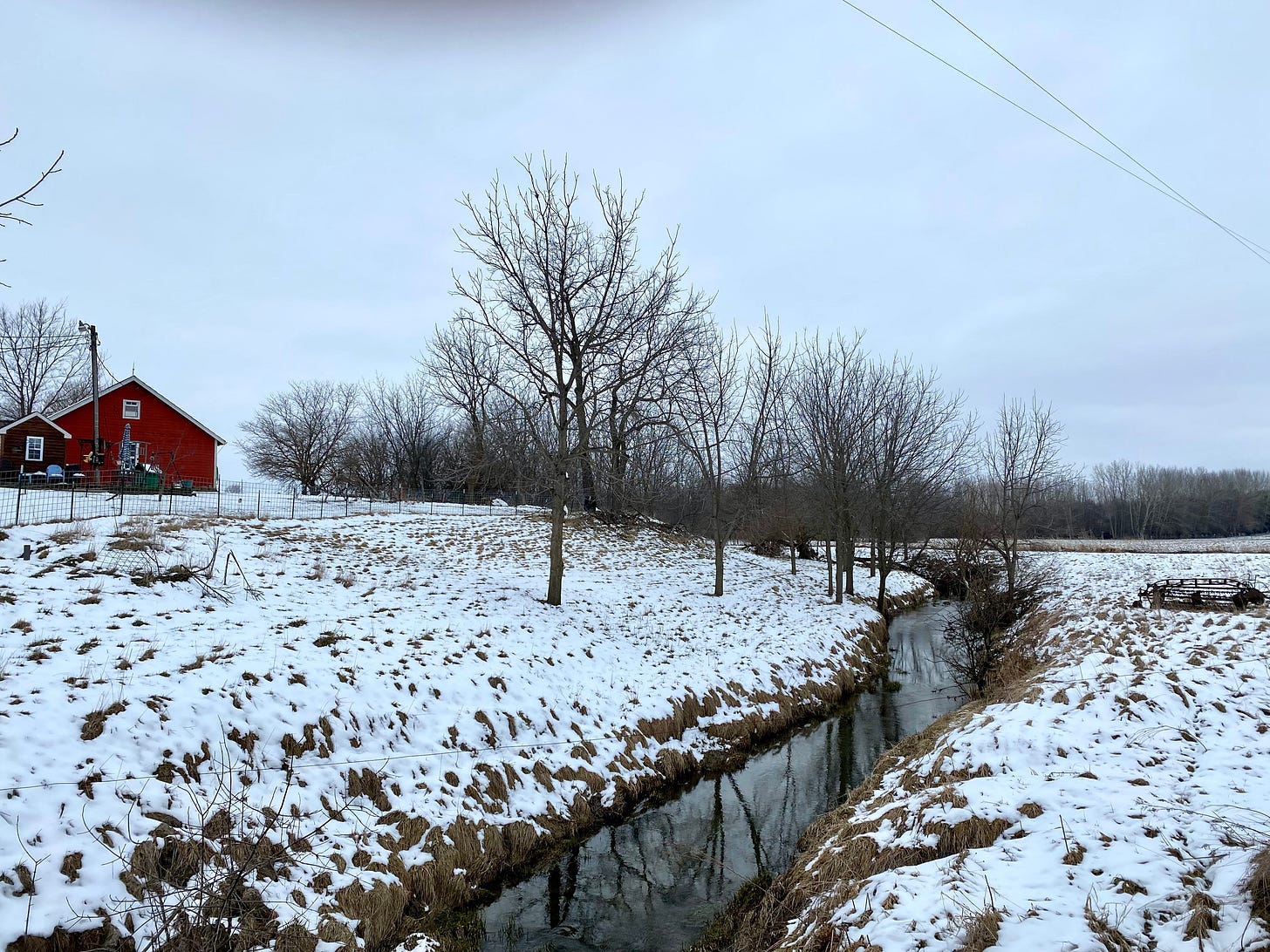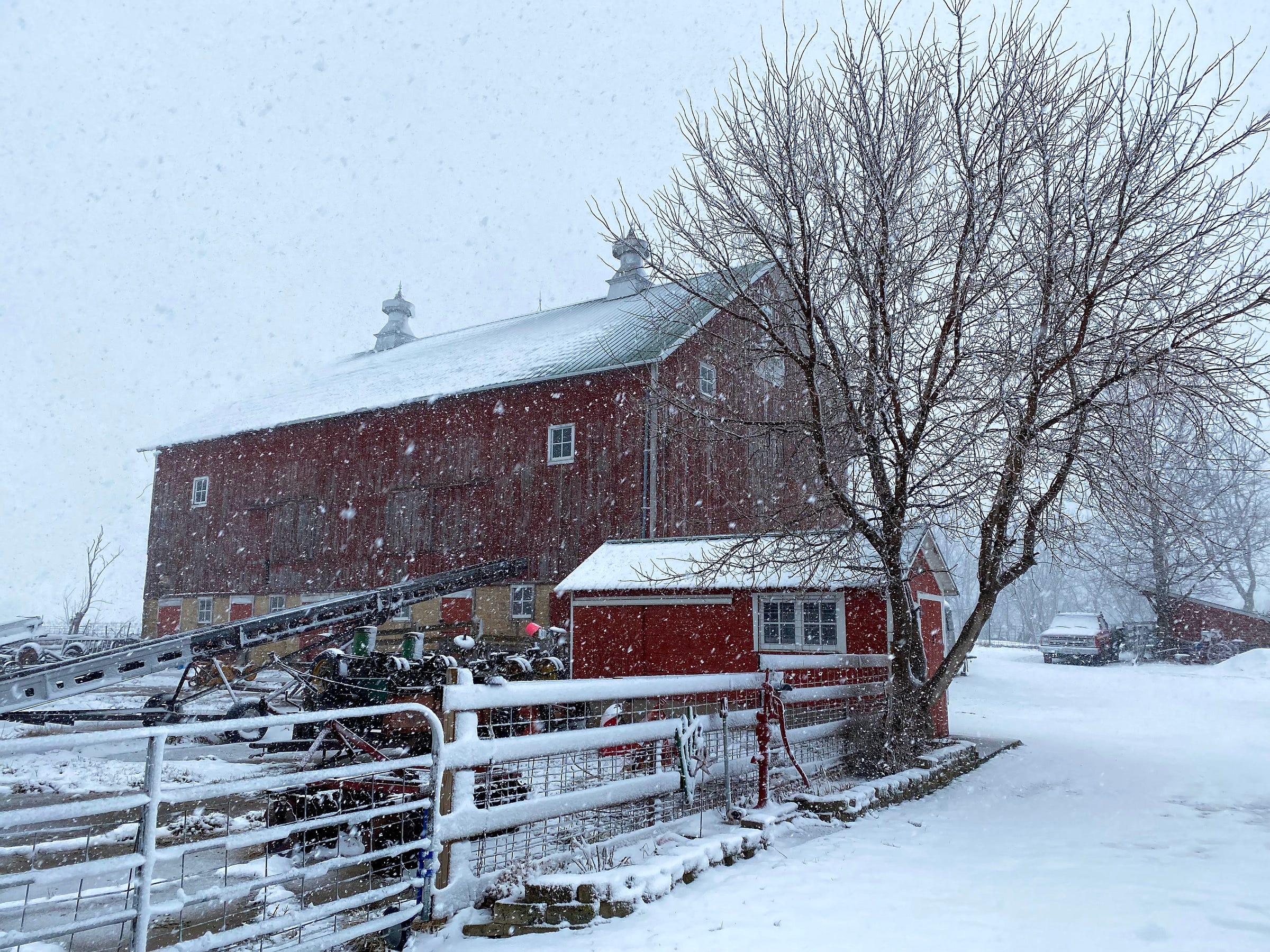I am writing from rural Illinois and I’m going to tell you up front, I don’t want to be here.
I left this town when I was young for all the usual reasons—to go to university, to work a job that had a future, to find a place where I made more sense. The intervening years have only multiplied the reasons to stay away.
There was a time when Filha was small when coming here was fun. Oh, look at the strange place that made me. Isn’t it so quaint, so picturesque. So different from California. Look at all the cornfields! Let’s go ride a pony!
Things got less fun around 2015, 2016 when we began to realize my mom was losing her mind.
Aging brings with it a thousand indignities, even if you’re not plagued with illness and infirmity. My parents are both 80 now. My mother suffers from dementia. My father suffers from what he calls “quiet desperation.”
Mom was always the caretaker and homemaker but those roles fall to my dad now. He does his very best, he tries so very hard, but he is very clearly drowning.
I haven’t been here since last May. Marido came through and spent nearly a week last September when he was in the States for work. My sister came for three weeks, and a few months later her husband came for one. We split up, try to spread our visits out, try to stretch ourselves across the year. This month, it’s my turn.
It feels like I have so many other things pressing, like there isn’t time to be here. But there is, of course there is. There is always time for heartache.
When you only see someone once or twice a year, every change is magnified. My parents both look smaller, my mother thin-skinned and delicate; my father faded and raggedy about the edges.
But glad to see me.
When I walk in the door in the dark after a 10-hour flight and 2-hour drive, my mother crushes me in a hug that’s surprising in its bony strength. Her errant whiskers scratch my cheek.
She remembers me in spite of my shorn head. I had prepared myself to be confused for my sister. But my mother knows who I am, although I suspect she sometimes forgets what she named me.
The day after I arrive, snow falls. March, coming in like a lion. Fat wet flakes slap our faces so hard we have to squint as we exit the grocery with raisin bread and bananas. “This is my oldest daughter,” my mother said to the cashier. “She lives overseas.”
By the time my father returns from the machine shop in the afternoon, the ground has disappeared, the trees festooned in heavy white bunting. My mother chases me from the barn where I’m feeding a piece of toast to my favorite donkey. Her white hair droops with a cap of snow. It’s 4:00pm. She demands that we drive into town for dinner.
She is wearing navy cotton pedal pushers, tennis shoes and a spring jacket. My father and I try to bundle her into a winter coat (he has bought her three in attempts to get her to wear one), into woolly boots, into anything weather appropriate. She refuses and shakes her cane at us as if it’s a weapon. (It is.)
“I’m FINE,” she insists and stalks out ahead of us into the blowing snow.
I manage to wrap her neck and shoulders in the soft cashmere scarf I chose at a Christmas booth in Setúbal. She rolls her eyes, sighs heavily. As soon as I start the car, she pulls off the scarf and throws it on the dashboard. In the next breath she’s shivering, wrinkled fingers patting at the heat vents. My father and I meet eyes in the rearview.
She’s always been this stubborn.
It’s been years since I drove in a snowstorm, but some skills you don’t forget. The plows have not yet come through. I can’t tell the road from the ditch. I creep along slowly, not quite white knuckling the wheel. Pink knuckling.
My mother, coiled in the passenger seat, tells me to be careful. Watch out. She sucks air through her teeth. The headlights bounce off eddies of white. “Pedal to the metal,” mom says. This is her new catch phrase. She likes to drop it on you when you least expect it. In grocery store aisles, hunting for Lawry’s. In the living room, folding laundry. In the car in the midst of a blizzard.
When we reach our destination, the parking lot is packed with pickup trucks. They call this place Pizza Ranch. The walls are painted ochre and rust. A mission statement is framed in size XXL near the cash register. I’ve never seen a restaurant with a mission statement. “To glorify God by positively impacting the world,” this one says. In the bathroom they pipe in the try-hard wails of Christian Country Western: Jesus, yours is the victory, whoa!
My mother likes this place because she doesn’t have to read a menu. Menus are overwhelming. So many choices, so many words that don’t quite translate to edible morsels in her mind. The buffet displays the food under heated lamps. You can just reach out and take what you want. You don’t have to read. Or think.
Tonight the special is Bacon Cheeseburger Pizza. Every other person is wearing a Chicago Bears hoodie and camo baseball cap.
I want to go home.
I cried the night before I left Portugal, absolutely bawled while shoving a warmer pair of socks into a crevice of my suitcase. Marido was cleaning the filter on the dryer. I walked up to him, chin crumbling.
“Do you want me to hug you with dirty hands?” he said.
I sniffled. Nodded.
I wanted to stay there, behind the barricade of my Portuguese walls. Wanted to stay beneath the high, bright sky.
In Illinois the sky is so low it crushes your soul.
When I called my dad two weeks ago to tell him I was buying plane tickets he said, “Well I hope you don’t feel like you have to come.”
He didn’t say that in a bitchy way. My dad is never bitchy. I’m tired and I don’t know how to render his tone for you. All I can tell you is that he was utterly sincere. Just like he was Friday afternoon when I apologized for not cleaning out the basement as I had promised. I succumbed to a potent cocktail of heartache and jet lag on the couch for two hours instead.
“It’s ok! You’re on vacation!” he said. Every ounce of him is genuine.
But I am so very not on vacation. And I did come because I felt like I had to.
Love and duty and guilt is all bound up in gordian knot. I can hardly parse one strand from the other. Every fiber is too tightly enmeshed.
I got up early the next morning and tackled the basement. My mother kept calling down the stairs, “Do you need any help, honey?”
“No thanks!” I’d call back every three minutes.
She’d tap her cane on the stairs, threateningly. As if she didn’t believe me.
“Do you ever feel like you forget things?” I ask my mother on Saturday morning. We are driving into town to get her hair washed and set.
She thinks for a moment, pursing her lips, then shakes her head. “No. I don’t forget things.”
This is right after she asks me if Marido has ever been to the farm before, ever visited, ever met her. They’ve known each other for 25 years.
As we drive she exclaims in dismay over roadkill. “Ohhhhh no! Somebody hit that poor critter!” she points.
I swerve to avoid the smashed possum. I’m already avoiding the direct route to town because there are at least two dead raccoons on the shoulder and she mourns over them every single time we pass by.
If there’s no roadkill she counts farm houses, points at one and tells me, “A maiden lady lives alone there.” or “Four or five guys live in that one all together. It’s bad news!”
I can’t tell if any of this is fact or fiction. Just yesterday she told me she used to work at an animal rescue. (She never did.) It seems that any house with three or more cars parked in the driveway has “a bunch of guys camping out there.”
By the third day I can’t take it any more. When she points to one of the “bad news guys” houses, I laugh.
“Mom. What if it’s a bunch of women living in that house, not men?” I ask.
She looks at me in shock. “You’d better hope not!” she huffs out an exasperated breath. “Pedal to the metal.”
Right now as I’m typing on one couch, she sits on the other staring into the fire. She clasps her hands together, turns them over, unclasps them, begins again. She asks me how many children I have. Every five or ten minutes she gets up to micromanage how the dog sleeps (“Bella, get on the couch! Bella, get off the couch!”) or she’ll climb the stairs to count the cats (there are 3). Then she comes and sits down, stares into the fire again, repeats the process, asks me how many cats I have.
She used to be a whirling dervish of doing. Cleaning or sorting or gardening or scolding or rummaging or teasing or cooking or mothering or mending. Never sitting still. Now she’s caught in a loop inside her head, pressing replay/replay/replay on the most minute of moments.
I’m either going to cry or burst out of my skin.
It is dark on the way home from yet another Pizza Ranch dinner. I turn the rental car (a Kia Soul) onto the country lane that leads west. In the distance I see the green shine of animal eyes—deer, crossing the road. I slow to a crawl and my mother says, “What’s the matter?”
“Deer,” I whisper as if my voice is louder than an engine.
“Ohhhhhhhhh!” she breathes.
Here they come, crossing the road in the headlight shine. One, two, three four five, my mother counts them all. Six-seven-eight appear from behind snow laden pine trees, hesitate in the ditch before setting one small hoof on the pavement.
“Come on, come on,” my mother encourages. She is whispering, too.
The last two cross the road in a rush, white tails flashing danger! danger! as they join the herd.
I keep my foot on the brake for a few more seconds in case of stragglers.
“Wow!” my mother says, and giggles exactly like the woman I used to know. “Wasn’t that neat!?”
She is effervescent. We laugh along with her, me at the wheel and my father in the back seat.
Not in the moment, but hours later as I’m falling asleep I realize that I got what I came for. I came to help, to be a dutiful and loving grown-up daughter, yes, sure. But I also came hiding a small nameless hope. I came looking for a moment.
Moments are all we really get in this life.
Moments that crush us, that make us soar. Moments we spend our nightmares reliving—those are the ones we go to therapy to lose. But there are others we hoard like dragon treasure, hold close like a newborn babe. We seek out those moments, try to conjure them, manufacture them. But the best ones just appear, unforeseen.
That’s why I keep coming back here. Why I put up with Pizza Ranch, suffer through the oppressive gray and the maddening loops and the antiquated ideals.
I think that’s also how my dad bears up beneath his interminable grief.
We just need a moment, one or two. Something precious we can polish and save for later, when things are worse…
Deer, darting safely through the darkness
and the buoyant sound of her delight.
Copyright © 2023 LaDonna Witmer










Beautiful and powerful and hard.
You are always a great writer, but this one is...WOW. Sending you hugs, and also to your parents. Safe travels back.